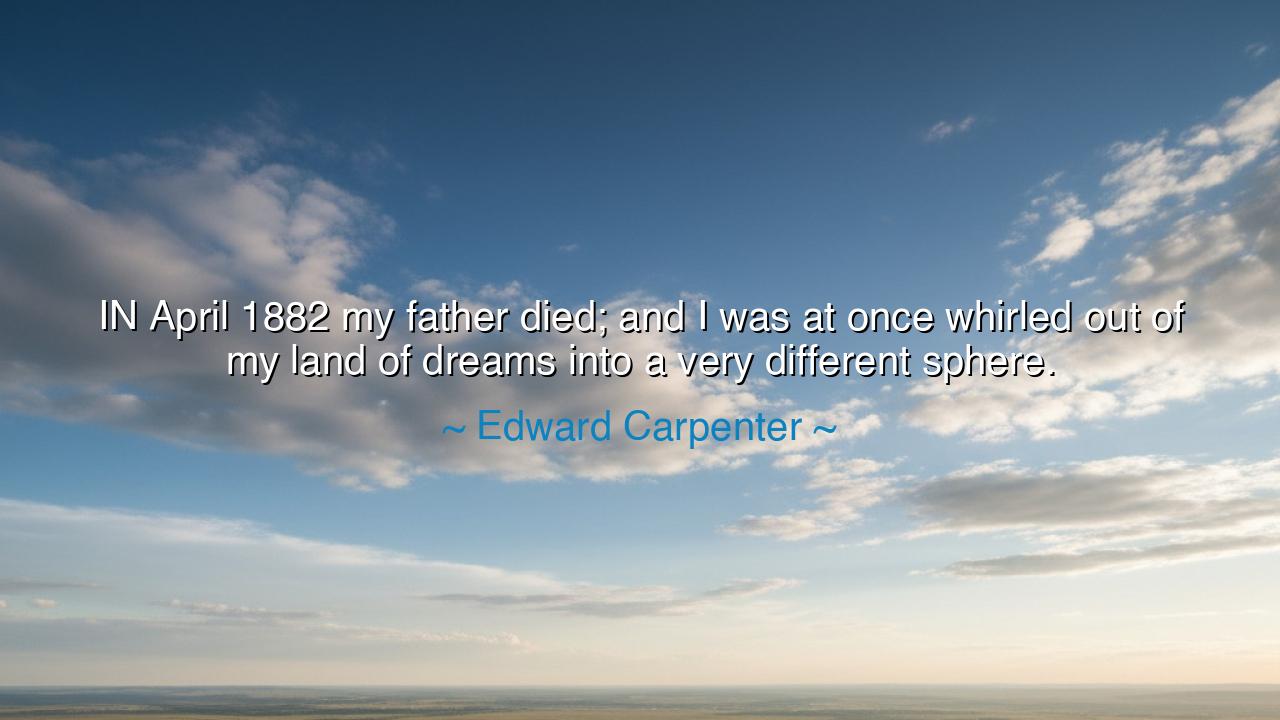
IN April 1882 my father died; and I was at once whirled out of my
IN April 1882 my father died; and I was at once whirled out of my land of dreams into a very different sphere.






The words of Edward Carpenter, “In April 1882 my father died; and I was at once whirled out of my land of dreams into a very different sphere,” are simple in form yet vast in meaning. They speak not only of grief, but of the sudden awakening that comes when the shelter of innocence is torn away. Beneath the quiet sorrow of this statement lies a profound transformation—the passage from the world of dreams into the world of reality, from safety into struggle, from the soft cradle of dependence into the hard terrain of selfhood. In these words, Carpenter captures a moment known to all who live long enough to lose what anchors them: the instant when life ceases to be something imagined and becomes something endured.
The origin of this quote lies in Carpenter’s own autobiography, where he reflects on the turning points that shaped his life and philosophy. A poet, philosopher, and social reformer of the late 19th century, Carpenter was a man of deep introspection and vision. The death of his father in 1882 marked not only a personal loss but a spiritual upheaval. Until then, he had lived in a kind of “land of dreams”—a life cushioned by comfort, education, and the security of family wealth. But when death entered, as it inevitably does, it stripped away illusion and thrust him into the harsh reality of independence, responsibility, and awareness. It was not merely his father who died, but the boy within him.
To be “whirled out of a land of dreams” is to be pulled violently from the quiet garden of innocence into the storm of experience. It is the moment when life ceases to obey the gentle order of imagination and begins to reveal its raw, ungoverned nature. Carpenter’s phrase is filled with motion and shock—“whirled,” not “led,” not “moved.” It suggests that such awakenings come not as gentle invitations but as storms that tear us from comfort and hurl us into growth. In this sense, his grief was also his initiation—the beginning of wisdom purchased at the price of sorrow.
The ancients knew this transformation well. The Greeks spoke of Anagnorisis, the moment of recognition in tragedy when the hero’s ignorance dissolves, and truth strikes like lightning. In the story of Oedipus, the king’s world of noble pride and illusion collapses when he realizes he himself has fulfilled the prophecy he sought to escape. That realization destroys him—and yet, in that destruction, he is purified. So it is in Carpenter’s life and in ours: the death of a parent, the fall of an illusion, the breaking of a dream—these moments, though they wound, also awaken. They reveal life’s impermanence and demand that we live not in fantasy, but in understanding.
In Carpenter’s own journey, this awakening propelled him toward a new purpose. No longer bound to the expectations of his family or the safety of inherited privilege, he turned his heart toward truth and service. He left behind the rigid class structures of Victorian England and devoted his life to the working people, to spiritual freedom, and to love unbound by convention. The death that had shattered his world became the source of his rebirth. His father’s passing forced him to see life as it truly was—a landscape of pain, beauty, and impermanence—and from that vision, he chose to live with compassion and authenticity.
Yet, there is a universal law beneath Carpenter’s personal story: every soul must one day leave its own “land of dreams.” We each begin life surrounded by illusions—the belief that things will last forever, that love will not fade, that those we depend upon will always remain. But life, with its strange mixture of grace and cruelty, teaches otherwise. When loss comes, when comfort ends, we are “whirled” into the real—where we must build meaning not upon security, but upon strength. The pain of that awakening is great, but within it lies the seed of wisdom. For those who refuse to awaken remain forever children in spirit, clinging to shadows while the world moves on without them.
So, the lesson of Carpenter’s words is both sorrowful and triumphant: do not fear the breaking of your dream, for it may be your entrance into truth. When the soft illusions of youth fall away, let them. When life tears the veil from your eyes, face what is revealed with courage. Grieve, yes, but understand that every loss is also a teacher, every ending an initiation. From the death of one world, another begins—wider, deeper, more honest.
Let us, then, honor those moments that “whirl us” from comfort into awareness. For they are the fires in which the soul is forged. The land of dreams is sweet, but the sphere of truth is sacred. And when life calls you, as it called Edward Carpenter, to step from one into the other, do not resist. Walk forward, even in grief, knowing that every dream surrendered becomes the foundation of a deeper, wiser life.






AAdministratorAdministrator
Welcome, honored guests. Please leave a comment, we will respond soon